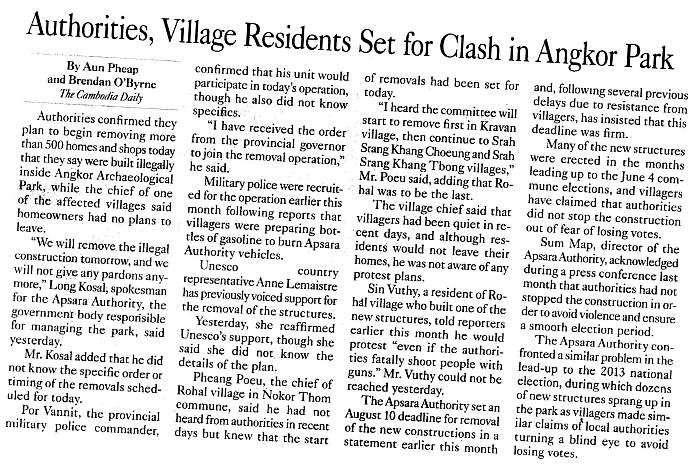
This is such a typical scenario in Cambodia where poor villagers are taken advantage of by venal, unscrupulous officials. Here’s how it worked:
- New buildings are prohibited in the Angkor Archaeological Park, a wise and necessary move to preserve the ruins and structures like Angkor Wat.
- Suddenly in June, 2017, a month before the commune (a group of villages) elections, 500 new houses and structures are put up inside the park. (Did 500 families just suddenly all get the same idea that they should build illegally in a protected area? Could it be that there was a hint that, for a little exchange of money, they could get a letter allowing them to build?)
- The authorities not only do not complain, they issue permission letters.
- After the election, someone in authority notices that there are 500 new illegal structures within the park and orders them removed, the people waving their worthless “permission” letters all along.
- The people may be able to recover some tin roofing sheets, etc., to be used again but their investments–some of them made with loans that now need to be repaid–are gone.
The authorities admit that they didn’t tell the villagers not to build because they didn’t want to lose their votes for the ruling party in the commune elections. Note these paragraphs from the clipping above:
“…villagers have claimed that authorities did not stop the construction out of fear of losing votes.
“[The] director of the Apsara Authority acknowledged during a press conference…that authorities had not stopped the construction in order to avoid violence and ensure a smooth election.
“The Apsara Authority confronted a similar problem in the lead-up to the 2013 national election, during which dozens of new structures sprang up in the park as villagers made similar claims of local authorities turning a blind eye to avoid losing votes.”
Almost no piece of paper is issued in Cambodia without someone being paid. And it probably wasn’t the government collecting money for the worthless papers. Why doesn’t the government prosecute the local officials for fraud and malfeasance? Ah, business as usual.